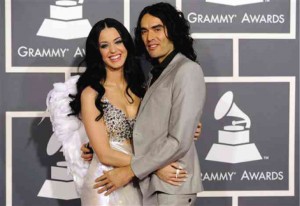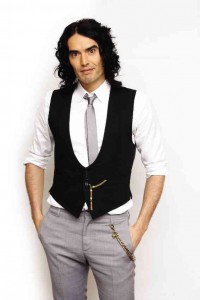Katy Perry keeps him grounded
LOS ANGELES—“Love has completely changed me,” declared Russell Brand in a recent interview. Is this the man named “Shagger of the Year” three times in a row?
Married to singer Katy Perry since last October, the former sex and drug addict, who stars in the remake of “Arthur,” said, “Suddenly, the most important thing to me is not my own happiness but Katy’s safety and happiness. That was a massive transition for me.”
The raunchy stand-up comedian, who wrote about his sexual and other shenanigans in “My Booky Wook” 1 and 2, was his usual funny self in our latest interview. Needless to say, laughter punctuated the session. But it does look like the Brit, actually one of the most erudite personalities we’ve interviewed, has found a grounding inspiration in Katy.
Nattily dressed as usual, the actor, who appeared in such films as “Forgetting Sarah Marshall” and “Get Him to the Greek,” plays the drunken, wealthy playboy originally played by the late Dudley Moore. Helen Mirren, Jennifer Garner and Greta Gerwig co-star. He is also the voice of the Easter Bunny in the live action/animated hybrid, “Hop.”
The following are excerpts from our chat:
Arthur goes back and forth between being childlike and childish. Do you think of yourself in anyway as childlike or childish?
Article continues after this advertisementChildlike wonder is remarkable. Some of the great artists of all time—Buster Keaton, Charlie Chaplin—were childlike. These people like to see with “new” eyes the wonder that surrounds us everywhere in nature, to see the possibility for love and fun in all people. Arthur has this quality. Childishness is when people become spoiled, self-centered and self-infatuated. These are qualities that need to be inhibited. Of course, I hope that I have childlike qualities. I try to approach each day with love, hope and optimism. Any kind of selfishness is childish. It is the duty of a man to regard as more important the comfort and safety of others second to himself. Occasionally, in this job, it is easy to get caught up in thinking you’re important but fortunately, I married someone who finds it very easy to remind me that I am not.
Article continues after this advertisementYou’re close to your mother. What was her first reaction to Katy?
My mum absolutely adores her because Katy, in spite of the trappings of pop stardom, is a very down-to-earth, normal, young woman who has worked very hard to be where she is. My mum respects her hugely and Katy has been incredibly respectful to my mum.
You sing a bit in this movie. Have you dreamed of doing a duet with Katy?
Katy’s career would not benefit from a vocal contribution from me. She’s doing very well on her own. I’m a comedian. To be a good rock star, you have to take yourself seriously and comedians cannot do that so no, I have no intention to sing in any capacity other than for my supper.
How do you adjust from the incredible number of women in your life, as you chronicled in your two books, to settling down with one woman?
All of us suspect as human beings that while material or carnal pleasures are temporarily exciting, love endures so it’s not as immediately apparent. One has to work hard at love, particularly if there’s a partnership and responsibility. I’ve only been married a short while but the longer I spend married, the more I enjoy it. Of course, as a young single man, I enjoyed that lifestyle and I feel that I did enough research to be able to contentedly move on.
Did you really tell TV host Piers Morgan that sex now takes second place in your life to gardening?
That was kind of a joke. Otherwise, my garden would be a terrible mass of effluvia and molehills. There is obviously a transition from the monogamous life, like I’m very happily married, but before I lived a very different lifestyle. I was on an English cat show so I made a rather twee English joke in that situation. I’m really not good at gardening. The only things I’ve ever grown in my life were marijuana plants and that led to a lot of problems and headaches actually because I didn’t have proper lights—halogen lights. It was a bloody waste of time and I got arrested for it.
Going back to your mom, how influential is she in your life?
My mother is incredibly influential. My mum brought me up on her own. She was very ill with cancer when I was growing up but my mum always made sure that I felt safe and protected. I was the center of her universe. This relationship with her is the template for my relationship with all people. She taught me that it’s more important to listen to other people than to be heard, to be respectful and loving to everyone. Of course, as an egomaniac, a narcissist, I occasionally struggle with those principles. It is my mother that I thank for the fact that now, whatever I may temporarily think, other people are more important than me, particularly when taken as a mass which is how I look at them.
You wanted to take “Arthur” in a different direction toward the end. Why was that important to you?
It’s important that this story of this Cervantes-ish man-child ends with him accepting the responsibilities of becoming a man. Obviously, that’s a journey that I can identify with, having spent years in arrested development, arrested somewhat by excessive alcohol and drug use and indulgence in the pleasures of the flesh. Not that I’m suggesting that that was, in any way, childish but that was conducted like a man.
To pursue these selfish objectives—that’s not what it is to be a man. We have a culture that infantilizes us to make us passive consumers. “Buy this product to feel complete” when, in fact, completion can only be achieved internally, not through any transient or material pleasures, treasures or acquisitions so that’s why there is a spiritual element to the performance I gave as Arthur. It’s about becoming a man, sort of in a post-feminist world where the negative aspects of patriarchy and masculinity are forever highlighted.
Duty, responsibility, loyalty—these are the qualities of a man and these are good qualities. For me, it’s important that “Arthur” was a fairy story, a story about a prince, a prince without a kingdom as Heathcliff is described in “Wuthering Heights.” By the end of the movie, he has a kingdom, a jurisdiction, a mandate, and he knows what it is to be a man. In 1981, when alcoholism was not regarded with the severity that we currently view it, there was a little more frivolity and it was an “R”-rated movie. This is a PG-13 movie. It was important to me that the character had heart, that he is vindicated, that through love he becomes a man, accepts responsibility. Through the death of his friend, mentor and matriarch, he realizes that there is nothing now between him and death, nothing between him and God because that’s what happens when we lose our parents. We are confronted with the bare facts of existence.
So while it is a story that is palatable, palpable for people of all ages, these themes are prevalent in all storytelling—the Inuit tales, Bavarian myths, the stories of the people of Native America. They all talk about these relationships, these journeys.
What did Dudley Moore represent to you as a comedian?
I really loved Dudley Moore. People say, “Were you daunted or did you feel it’s in any way disrespectful?” I answer, “I like Dudley Moore. For me he was like a personal hero. I loved him so I would never do anything to denigrate or desecrate his memory.” I loved Dudley not only because of “Arthur” but also because of his “Derek and Clive,” “Pete and Dud” and “Beyond the Fringe.” In that moment, there was this élan, elegance and intelligence suddenly to British comedy that begat “Monty Python.” Dudley is part of that and yet he had that warmth because he was from Dagenham. He was like a working class man from Dagenham. He was incredibly musical.
With that laugh, smile, twinkle, Dudley could have been on the stage with Stan Laurel and the Marx Brothers. He had that kind of intelligence. So for me, this film and Dudley Moore’s memory are incredibly important. I saw it as a great honor but I was not daunted by it. I thought people wouldn’t give me this opportunity if they didn’t think I was capable of it. And you don’t do it alone. You make it with a brilliant director like Jason Winer, a fantastic writer like Peter Baynham and an actor like Helen Mirren who is incomparable to work with, so beautiful, talented, elegant and smart.
Arthur has a collection of movie cars, including the Batmobile. What kind of man toys do you have?
Man toys? You have to ask my wife. I don’t really have man toys. I’m a simple man, as you can see. The things that bring me most happiness are my wife and my cats. I don’t have a lot of technology. I only recently learned to drive. I’m still nervous and when I’m on the freeway, I still have to really concentrate because it’s a lot of responsibility, isn’t it? If you go “rrrr” just suddenly, there would be consequences to your actions. I am not a person who can afford to have a huge hangar full of jet skis and helicopters because for me, even roller skates are dangerous.
You suffered from bulimia when you were a teenager. Do you mind talking about it?
Of course not. I was self-conscious about the way I looked. I felt overweight and I grew up in a place where the important things are to be good at football or fighting. If you’re not good at either of those things, you’ve got the wrong currency. Being funny or having a peculiar perspective, these are not valuable commodities in Grays, Essex. I ate a lot. I just have a tendency toward addiction and consuming things. I just loved chocolate. I was lonely. My mum was sick and stuff so I got really into consuming. Then when I reached sexual awakening and became very body conscious, I thought, I don’t want to look like this anymore. There was a certain rationale to the bulimia.
E-mail the columnist at [email protected].

